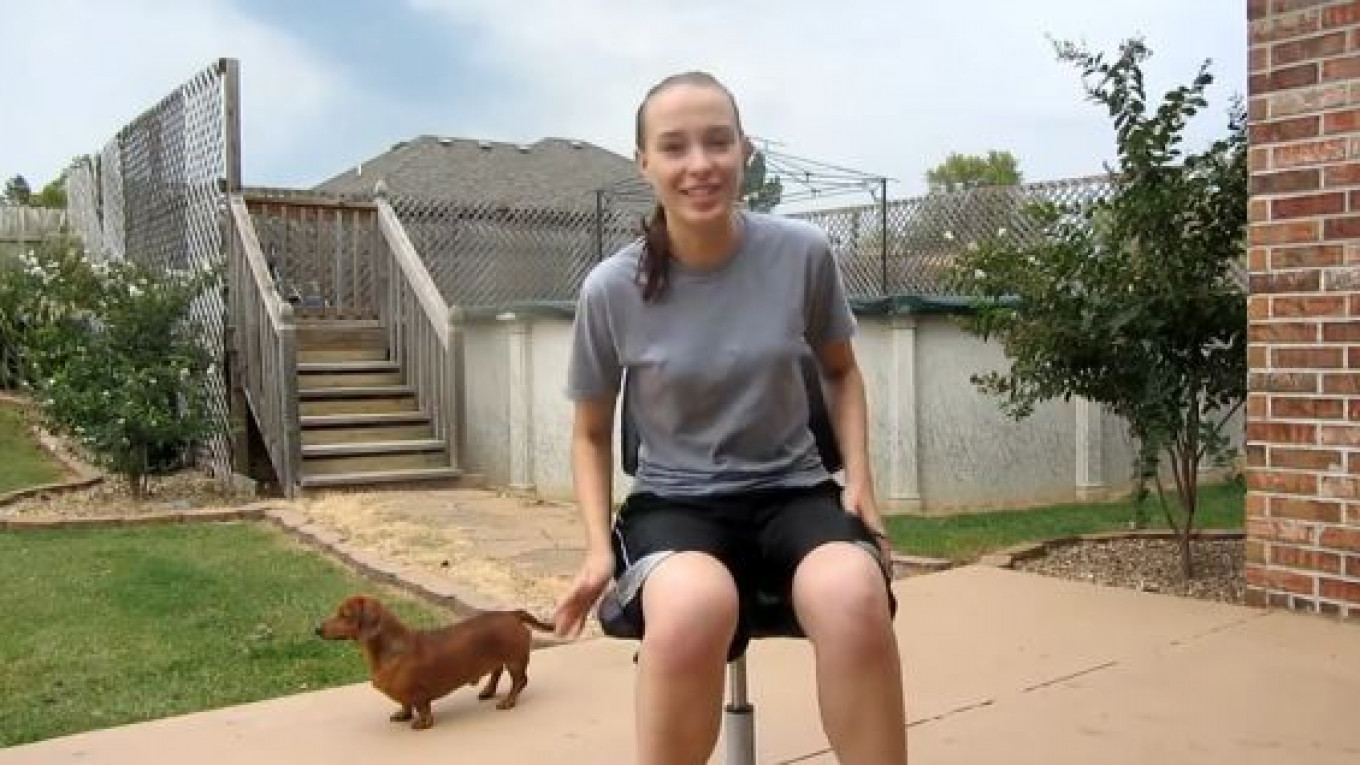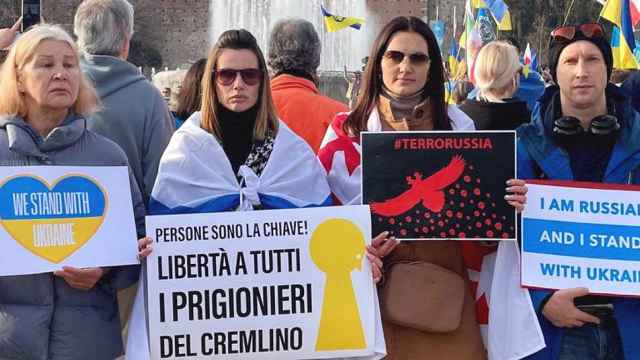The story of Darya and the 5-mile race is a typical FLEX story.
Darya Andreyeva, 17, a FLEX exchange student staying in Pocola, Oklahoma, wanted to run the race to raise funds for breast cancer research. Her parents back in Reutov, a Moscow suburb, said five miles (8 kilometers) was too far, given that Darya hadn’t been training for it.
“We tried to dissuade her … but Darya said that she had to run because lots of people would be doing it,” Darya’s mother, Yelena Sprygina, told The Moscow Times in an e-mail.
Darya reminded her parents that she’d signed up for FLEX, a U.S.-government funded immersion program for high school students from the former Soviet Union, to experience American culture, which for many Americans includes charity work.
After the race, Darya’s parents were surprised to learn that she’d spent about a third of her monthly stipend to participate — something that’s difficult to imagine a Russian teenager doing, Yelena said.
Every FLEX family has a story like this: a teenager immersing himself or herself in American life and explaining it to bewildered but supportive parents.
The stories are a reminder that while program participants do the traveling, their loved ones back home share the ups and downs, the pain of separation and the daily discoveries.
This years’ 244 Russian FLEX students, who live in American host families and study at American high schools, are ambitious, energetic, sharp and quite possibly Russia’s future leaders. The skills, perspective and confidence they bring back could change the country from the ground up.
The program is celebrating its 20th anniversary this academic year, and The Moscow Times has been following the teens in a series of articles that began with the rigorous selection process last November and will continue until the end of the school year next summer.
In e-mailed comments, parents shared the experience of watching from thousands of kilometers away as their children became more worldly and independent.
Program participants have to grow up fast in order to navigate a new family, school, and city in a non-native language. To thrive, they must make friends and experience new things, which could mean anything from trying out for a sports team to starting a ballroom dancing club.
Nearly three months into the program, parents said the effects are already apparent.
“You can already sense Yulia’s independence,” wrote Alfiya Abdullina, whose daughter, Yulia Abdullina, left Penza for Oak Harbor, Ohio, an agricultural village near the shores of Lake Erie.
Yulia has gotten better at “filtering out” the important things in life from everything else, or as her mother put it “the necessary from the unnecessary, the important from the empty and superfluous.” She’s also better at thinking through decisions and making the right one, Alfiya wrote in an e-mail.
At least one teen, however, wasn’t so sure whether she’d changed all that much.
“I haven’t noticed that I’ve fundamentally changed, but I’m certainly pushing myself out of my comfort zone,” Darya Andreyeva wrote, “Perhaps with regard to money I’ve begun to make a distinction between the things I need and the things I just want.”
FLEX hopes that the students will apply new skills to improving their communities in Russia.
Although program administrators bristle at the suggestion that they’re producing “little Americans,” they don’t hide the hope that the trip will strengthen certain values, including volunteerism, intolerance toward corruption, a multicultural outlook and a can-do spirit.
Parents said these and other aspects of local culture impressed their children.
“[Ivan] is amazed by how clean the streets are, by the fact that after two months in Gladewater, he hasn’t once seen somebody smoking on the street, by how everybody around smiles and is very friendly,” wrote Zhanna Syrtseva.
Zhanna’s son, Ivan Chesnokov, 17, moved from Kirov to Gladewater, Texas, the self-proclaimed “Antique Capital of East Texas.” It’s also where singer Johnny Cash wrote his hit song, “I Walk the Line.” “He says himself that he feels a bit American and he likes it!!!” she said.
Every conversation with Ivan brings a discovery about herself, her son, and the United States, she said. “Just yesterday, Ivan told me that he had donated blood!”
Many parents have been inspired to learn more about American culture
and history.
“We started independently studying Ohio … its history, economy, environment. And not only Ohio, but the United States itself,” Alfiya Abdullina wrote. “Now, any news about what’s happening there is extremely important to us.”
During recent U.S. Presidential elections, Yulia’s parents joined millions of Americans who anxiously awaiting the results from Ohio, a critical swing state.
FLEX parents and participants must also learn to be apart from loved ones. Most participants are away from their parents for the first time, and they’re encouraged to limit communications to make the transition easier.
“Probably every parent is a little sad without their beloved kids,” Zhanna Syrtseva wrote. “[Ivan] began saying he loves me more often. It’s probably only from a distance that you understand how precious your loved ones are,” she wrote.
“But the time is flying. It feels like just yesterday that we escorted them out of their home cities, but more than two months have already passed.”
The separation has provoked philosophical reflection for Tatyana Glotova and Mikhail Kozlov, whose daughter, Anna Kozlova, moved from Penza to Burlington, Wisconsin.
“Our planet Earth isn’t that big after all, and we all live here and shouldn’t forget it,” they wrote. “Despite the differences, we look a lot like one another. May our children, from all over the world, be friends and be happy.”
Related articles:
A Message from The Moscow Times:
Dear readers,
We are facing unprecedented challenges. Russia's Prosecutor General's Office has designated The Moscow Times as an "undesirable" organization, criminalizing our work and putting our staff at risk of prosecution. This follows our earlier unjust labeling as a "foreign agent."
These actions are direct attempts to silence independent journalism in Russia. The authorities claim our work "discredits the decisions of the Russian leadership." We see things differently: we strive to provide accurate, unbiased reporting on Russia.
We, the journalists of The Moscow Times, refuse to be silenced. But to continue our work, we need your help.
Your support, no matter how small, makes a world of difference. If you can, please support us monthly starting from just $2. It's quick to set up, and every contribution makes a significant impact.
By supporting The Moscow Times, you're defending open, independent journalism in the face of repression. Thank you for standing with us.
Remind me later.






